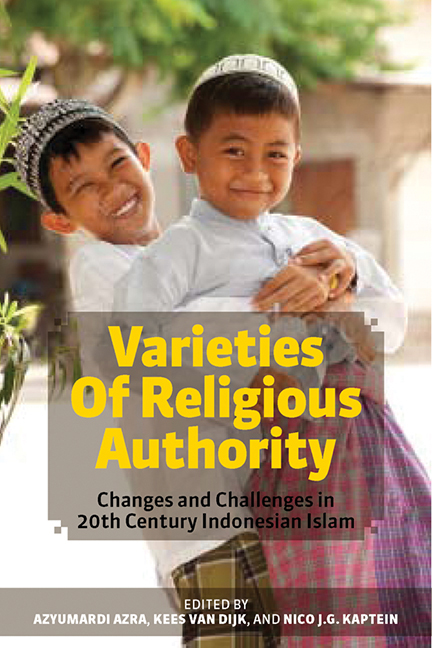Book contents
- Frontmatter
- Contents
- About the Contributors
- Acknowledgements
- Introduction
- 1 The Redefinition of Religious Authority among South Asian Muslims from 1919 to 1956
- 2 Understanding Al-Imam's Critique of Tariqa Sufism
- 3 Traditional Islam and Modernity: Some Notes on the Changing Role of the Ulama in Early Twentieth Indonesia
- 4 The Role and Identity of Religious Authorities in the Nation State: Egypt, Indonesia, and South Africa Compared
- 5 Authority Contested: Mathla'ul Anwar in the Last Years of the New Order
- 6 Struggle for Authority: Between Formal Religious Institution and Informal-local Leaders
- 7 The Indonesian Madrasah: Islamic Reform and Modernization of Indonesian Islam in the Twentieth Century
- 8 From Apolitical Quietism to Jihadist Activism: “Salafis”, Political Mobilization, and Drama of Jihad in Indonesia
- 9 From handling Water in a Glass to Coping with an Ocean: Shifts in Religious Authority in Indonesia
- 10 Religious Authority and the Supernatural
- Index
3 - Traditional Islam and Modernity: Some Notes on the Changing Role of the Ulama in Early Twentieth Indonesia
Published online by Cambridge University Press: 21 October 2015
- Frontmatter
- Contents
- About the Contributors
- Acknowledgements
- Introduction
- 1 The Redefinition of Religious Authority among South Asian Muslims from 1919 to 1956
- 2 Understanding Al-Imam's Critique of Tariqa Sufism
- 3 Traditional Islam and Modernity: Some Notes on the Changing Role of the Ulama in Early Twentieth Indonesia
- 4 The Role and Identity of Religious Authorities in the Nation State: Egypt, Indonesia, and South Africa Compared
- 5 Authority Contested: Mathla'ul Anwar in the Last Years of the New Order
- 6 Struggle for Authority: Between Formal Religious Institution and Informal-local Leaders
- 7 The Indonesian Madrasah: Islamic Reform and Modernization of Indonesian Islam in the Twentieth Century
- 8 From Apolitical Quietism to Jihadist Activism: “Salafis”, Political Mobilization, and Drama of Jihad in Indonesia
- 9 From handling Water in a Glass to Coping with an Ocean: Shifts in Religious Authority in Indonesia
- 10 Religious Authority and the Supernatural
- Index
Summary
But, ironically, while print enabled ulama to greatly extend their influence in public affairs, it was also doing serious damage to the roots of their authority. By printing the Islamic classics, and the print run for a major text could be as many as ten thousand copies, and by translating them into the vernaculars they undermined their authority; they were no longer necessarily around when the book was read to make up for the absence of the author in the text; … Books, which they literally possessed, which they carried in the hearts, and which they transmitted with a whole series of mnemic aids to memory, could now be consulted by any Ahmad, Mahmud or Muhammad, who could make what they will of them. Increasingly from now on any Ahmad, Mahmud, and Muhammad could claim to speak for Islam (Robinson 1993, p. 245).
The printing press exerted great influence on the way religious authority was created and shaped. The cited quotation confirms what happened during the printing era in the Muslim community in the Netherlands Indies, in which the rise of various voices of Islam by various Muslim leaders — not merely the traditional ulama — became a leading feature. They engaged in a contest of interpreting and discoursing Islam. In Indonesia, the increase in the number of Muslims “who could claim to speak for Islam” began to occur in the early twentieth century. This proceeded alongside the rise and the development of Islamic reformism in an increasingly modernized colony as the consequence of the Dutch Ethical Policy of the period. And one of the most prominent features of reformism was the advance of the products of printing presses (journals, newspapers, and books) in social and intellectual live.
The use of the printing press meant that Muslims no longer had to turn to a recognized mufti only. In one issue of Islam Bergerak (10 June 1917), one of the newspapers published by Hadji Misbach (a leading leftist Muslim activist of the Sarekat Islam), there was a question from a reader about eating pork when one was starving and could not find any other food to eat.
- Type
- Chapter
- Information
- Varieties of Religious AuthorityChanges and Challenges in 20th Century Indonesian Islam, pp. 54 - 72Publisher: ISEAS–Yusof Ishak InstitutePrint publication year: 2010

